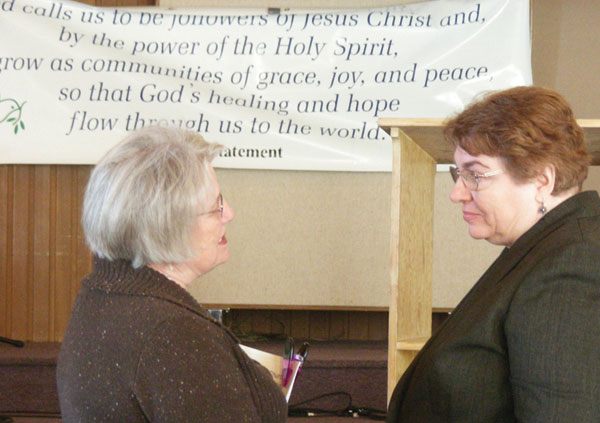With the theme of “Being a Peace Church,” 88 church leaders and others interested in the topic met at Living Hope Christian Fellowship, Surrey, for the annual Mennonite Church B.C. Leaders, Elders and Deacons (LEAD) conference on Feb. 25.
Keynote speaker Lois Barrett, director/associate professor of the Great Plains Seminary, Newton, Kan., entitled her talk, “Why are we a Peace Church?” She began by giving a short history of the Anabaptist movement, placing its beginning in 1525 in context with the Peasants’ Revolt in Europe.
Barrett noted that the words for “faith” and “faithfulness” come from the same root in both Hebrew and Greek, so for the early Anabaptists, Christian faith and living out a nonviolent faith went hand in hand. They also understood that becoming Christlike meant imitating Christ, as in the words of I Peter 2:21-25.
On the question of violence in the Old Testament, Barrett acknowledged some troublesome Old Testament passages. “God’s wrath is the boomerang effect of violence,” she said. “People reap the consequences of the violence. One difference between the Old Testament and the New Testament is that, in the Old Testament, people attribute everything to God.”
She talked about covenant language being used in reference to God’s relationship with God’s people: “If anyone is in Christ, there is a new creation” (II Corinthians 6:16-21). “It is covenant language, legal language, to say, ‘I will be your God and you will be my people.’ The language of covenant includes [the words] just, righteous, justice, righteousness, judgments.”
Between morning and afternoon sessions, participants could attend a choice of four different workshops on the themes of peace for youths, peace in the workplace, peace in the family, and peace in the church.
In the afternoon, Barrett focused on forgiveness and reconciliation. “What is the church’s missional vocation in a culture of fear and revenge?” she asked. “Forgiveness is not part of our culture. Our culture says fight fire with fire, not overcome evil with good. We live in a culture that has the myth of redemptive violence.”
Forgiveness can be unilateral, provides release, leaves vengeance to God if relationship cannot be repaired, and opens the door to reconciliation. Practical suggestions from Barrett for Christians today to cultivate the practices of reconciliation included, “Model the practices yourself, and carry the vision; listen, discern and communicate.”
Barrett said those in the church must teach, share and hold each other accountable. “The church is called to be a witness in the world,” she stressed. “The church is not the perfect example of Christ in the world, but it’s all the world has.”







Leave a Reply
You must be logged in to post a comment.